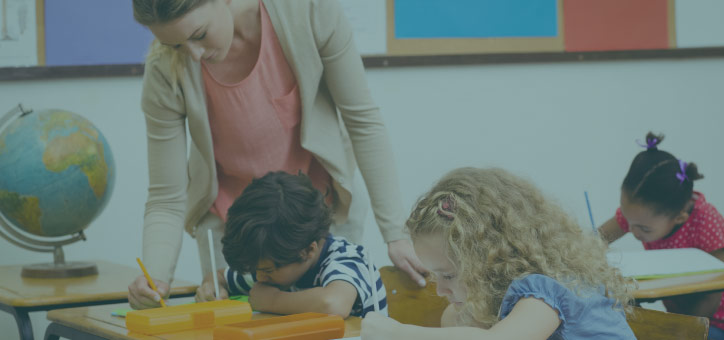Early childhood education, otherwise known as ECE, is a term used to refer to childhood education. If you’re wondering what grades are early childhood education, it ranges from birth to around age eight.
In these stages of a child’s life, teachers contribute largely to all areas of growth. This includes the physical, social, educational, and emotional development of their students. As a result, early childhood education training is crucial. Teachers, teacher’s aides, administrators, and others involved in the educational process must have the proper training and education to deliver age-appropriate schooling to children.
In this brief overview of early childhood education, we’ll look more closely at the grades you can teach with an early childhood education degree or similar.
What Early Childhood Education Grades Can You Teach With an Elementary Degree?
Elementary education relates to the period of academia that follows preschool or pre-K, but precedes middle school. In terms of age groups, this includes children from around age 6 to 11.
What grades can you teach with an elementary education degree? This includes kindergarten through grades 5 or 6, or the grade levels at which elementary school teachers work. While the terminology can often be confusing, there are differences between early childhood grades and elementary grades.
Many teachers will attest that one of the key differences between early childhood education and elementary education relates to the behavior and activity levels of the students. In terms of skills and knowledge, while there is some overlap, teaching at an elementary level requires greater levels of organization and working with other teachers more frequently. Learners at an elementary level have improved attention spans and better communication skills. You’ll need to be ready to respond to children’s unique learning styles and academic needs, too.
If you want to teach in an elementary school, you should have a bachelor’s degree in elementary education from a teaching certification program. This is the standard type of degree for teaching at this level, but there are other avenues for teaching elementary-aged students. For example, you might have a degree in secondary education with an emphasis in social studies, but by completing additional coursework, you might qualify for licensure as an elementary school teacher.
So, you now have the answer to your question, “what grades can I teach with an early childhood degree?” Generally speaking, it’s elementary grades up to grade 6. However, you might need additional training or a professional teacher certification to do so.
See Also: How Long Does it Take to Get a Certificate in Early Childhood Education?
What Can You Teach With an Associate Degree in Early Childhood Education?

Common questions prospective teachers ask Google are, “early childhood education degree what grades can you teach and what grades does early childhood education cover?“
First, let’s back up a bit and explore the differences in education that are needed for education.
While high school teachers are generally expected to have a bachelor’s degree to work in education, the same isn’t necessarily true for preschool teachers. With an associate degree, you’ll be able to find work in a preschool or as a childcare worker. Your responsibilities include managing groups of children as well as planning a curriculum packed with varied activities that contribute to all areas of their development. That said, if you wish to work in public schools as opposed to private schools, then you will need to have licensure within your state.
Getting an associate degree rather than a bachelor’s degree doesn’t mean that you can’t return to education to further your studies, knowledge, and skills. Many colleges and universities allow associate degree graduates to ‘top up’ their associate degree to a bachelor’s degree by transferring credits and completing additional coursework. This also means that your course of education will typically be cheaper and faster when compared to most of your peers to complete a teacher education program.
So, the grades you can teach with an early childhood education degree might vary depending on the type of degree. Generally speaking, with an associate’s degree, you can be a teaching assistant for any early childhood grade. With a bachelor’s degree, your options expand to being a certified teacher for any early childhood grade.
What Degree Does a First Grade Teacher Need?
While it’s generally agreed that early childhood education comprises children up to around age eight, you will need a bachelor’s degree in a relevant area of education to become a first grade teacher, including for children around ages 6 to 7 years old. You’ll be responsible for helping children make the transition between kindergarten and the first grade, which involves much more rigorous activities than the children will be accustomed to. You’ll work on developing a curriculum that features basic literacy, numeracy, social, and scientific skills, ensuring that each child is ready for the path ahead. The skills you need to do so are taught in degree programs for elementary educators.
As a teacher of the first grade, you will be expected to major in a particular subject area during your bachelor’s degree. You will also normally need to undergo a teacher preparation program, which involves a student teaching placement.
See Also: What Is Creative Curriculum in Early Childhood Education?
Can You Teach Kindergarten With an Early Childhood Education Degree?
The answer to this question is that it depends. In some instances, kindergarten teachers are required to have a bachelor’s degree in elementary education. In others, a bachelor’s degree in early childhood education might suffice for teaching at this level.
Some school districts have different rules than others regarding the type of degree and license a kindergarten teacher holds. Likewise, licensure and certification requirements vary from one state to the next. If you’re not sure which degree you should pursue, it’s prudent to contact the department of education in the state in which you wish to work to learn about the specific requirements. Department of education officials can give you the specifics regarding what grades can you teach with early childhood education degree as well.
What Preparations Do You Undertake in an Early Childhood Teacher Education Program?
A teacher education program has several different components that help prepare you to be a classroom teacher.
First, you’ll take coursework in a variety of subject that give you the knowledge and skills to help further the development of your students. This might include:
- Instructional Design
- Educational Psychology
- Early Childhood Development
- Classroom Management
You might also take courses in teaching English to speakers of other languages (TESOL), teaching advanced children, or working with emotionally disturbed children.
Additionally, teacher education programs include practicum and internship opportunities in which you get to work with real students in a real classroom under the supervision of an experienced teacher. These field experiences are critical to your development as a teacher. They enable you to observe expert teachers at work, practice your newfound teaching skills in a supportive environment, and gain confidence that you have what it takes to be a successful teacher.
The specific requirements of a teacher education program vary from one college to the next. However, if a school is accredited, the general requirements will very similar regardless of the school you attend.
Additionally, some early childhood education programs have accreditation from the National Association for the Education of Young Children (NAEYC). You can search for NAEYC-recognized programs in their online directory. Enrollment in a NAEYC-recognized program ensures that you get the highest-quality education and professional preparation.
What is the Role of a Teacher in an Early Childhood Program?

While the central question we want to answer is “what grades can you teach with an early childhood education degree” or “early childhood education is what grades,” the role of a teacher in early childhood education is also important to discuss.
It’s important that children are prepared for the long academic path ahead. As an early childhood educator, you will need to help children adjust to following a daily routine, including personal hygiene and nutrition, recreation, and most importantly, studying. Learning to study and operate in a structured environment is an essential part of every child’s development.
You’ll have other responsibilities, too. You’ll need to be mindful of safety and providing a comfortable environment that allows children to develop confidence. However, this will need to be balanced with the provision of a structured environment that also features discipline and rules.
In our increasingly multicultural world, you will also need to be mindful of individual differences and the need to support special or cultural needs. This might include food intolerances, religious or cultural differences, or physical disabilities. You will always need to be prepared to make adjustments to your lesson plans or schedules to accommodate students with a diverse spectrum of needs.
To learn more about working in the early childhood education space, read our guides on How Long Does it Take to Get a Certificate in Early Childhood Education? and What Classes Do I Need for Early Childhood Education?





